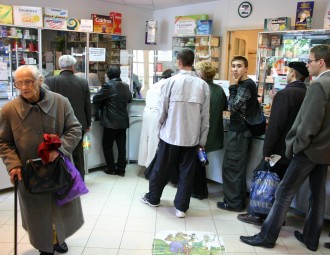For many Belarusans long queues and low salaries in health care matter more than democracy

In regional context it may seem that Belarus has a similar health service to Poland or Lithuania; however, life expectancy in those countries remains higher than in Belarus, writes Ryhor Astapenia.
On 21 October, Aliaksandr Lukashenka explained to the Regional Office for Europe Director of the World Health Organisation, Zsuzsanna Jakab, how Belarus had succeeded in improving its health service and received many compliments from her for that.
Belarus has achieved much in the fight against certain diseases and has placed modern medical equipment in many hospitals. But a few significant problems remain in the Belarusian public health system, some cities are missing up to 40% of the necessary personnel. On top of this the average medical worker earns only $325.
Moreover, the authorities continue a hypocritical policy of allowing alcohol to be easily accessible to Belarusians and isolating the Belarusian health system from global trends.
WHO praises Belarus for good results
On 21 October, Aliaksandr Lukashenka met with the WHO Regional Director for Europe Zsuzsanna Jakab, who openly praised the Belarusian ruler "for leadership and efforts aimed at improving the health care system that have already brought a clear result." Jacob arrived in Belarus for a WHO conference "Health 2020", which brought together several hundred European experts in the field of medicine, including 13 ministers of health.
In fact, public health remains one of the areas where the Belarusian authorities have achieved results. In 2013 the World Health Organisation stated that Belarus had achieved the Millennium Goals. According to the Bloomberg ranking, the Belarusian health care system is almost as efficient as the health service in Belgium. The Belarusian authorities have purchased modern equipment for Belarusian hospitals and built new medical centres. In 2015, the first nursing care hospital for patients with chronic diseases and disabilities was built in Minsk.
Belarus has achieved good results in the immunization of children, the fight against HIV/AIDS, tuberculosis, child and maternal mortality. The authorities like to underline that no mother died in Belarus during childbirth in 2015.
The health service remains quite affordable for ordinary people, and Aliaksandr Lukashenka has not lost a single opportunity to emphasise this. On 21 October, he stated that "unlike other countries, people in Belarus do not die under a fence if they lack insurance."
Belarusian health care brings not only international recognition, but also money. Although 95% of medical centres remain state-run, they provide more and more paid services for Belarusians and foreigners. Former chief of Mossad intelligence, Meir Dagan, had a liver transplant in Belarus and Russian neo-fascist, Maxim Martsinkevich, had an eye operation in Minsk.
Russians often use the services of Belarusian clinics as they remain cheaper, better run and more effective than Russian ones. For instance, MRI of the brain in Belarusian top clinic costs around only $60.
Another story of the Belarusian health service
Yet in reality many Belarusians have another vision of the domestic health care system than Aliaksandr Lukashenka. This is due to the lack of specialised doctors and huge queues at clinics.
Some Belarusian cities, according to the Health Minister Vasil Zharko, lack 30-40% of necessary medical staff. Furthermore, a large percentage of the existing staff are either retired, due for retirement or are interns. Often it remains impossible to get an appointment with a doctor, because there is not a qualified doctor in town. Even if a hospital has modern equipment, the waiting time for the use of the equipment can be a few months.
A few doctors even leave the profession or the country because the average salary of health workers, according to official statistics, in September totaled $325. Naturally, doctors earn more, and medical personnel such as nurses earn less. In neighbouring Poland by contrast health workers earn three times more than in Belarus.
To earn this money, health workers usually have to take one and a half full time jobs. Doctors joke, that if they worked only one job, they would have nothing to eat, but if one works two jobs, he has no time to eat.
Isolated health service
In the regional context it may seem that Belarus has a similar health service to Poland or Lithuania. All of them have achievements and failures. However, life expectancy in Poland or Lithuania remains higher than in Belarus by five and two years respectively. Moreover, the difference between life expectancy among men and women remains striking in Belarus. Belarusian women live on average 78 years, while men only live to 67.
The state policy of alcoholisation partly explains the issue. It remains difficult to achieve good results in public health, when Belarus ranks first, according to the WHO, in world consumption of alcohol, and the state keeps alcohol prices low. Belarusians also occupy a leading position in Europe in terms of obesity and smoking. State institutions remain reluctant to see health system holistically, so they should not expect that Belarusians will have long healthy lives.
Also Belarusian health care lacks contacts with the outside world or even some basic opportunities to improve qualifications. Usually Belarusian doctors who would like to visit a foreign conference, have to take a vacation at their own expense, ask for permission to participate in the conference and pay all the costs of the conference from their pockets.
Despite the fact that the issue of medical care matters for the majority of Belarusians and opposition now and then try to politicise the issue, public health still has not become a topic of national debate. Even independent media rarely write about Belarusian medicine. However, many people would be grateful to the media and opposition, if they pressed the question of long queues and low salaries. For many, such issues matter more than democracy and human rights.
Originally published at BelarusDigest
-
03.01
-
07.10
-
22.09
-
17.08
-
12.08
-
30.09



























